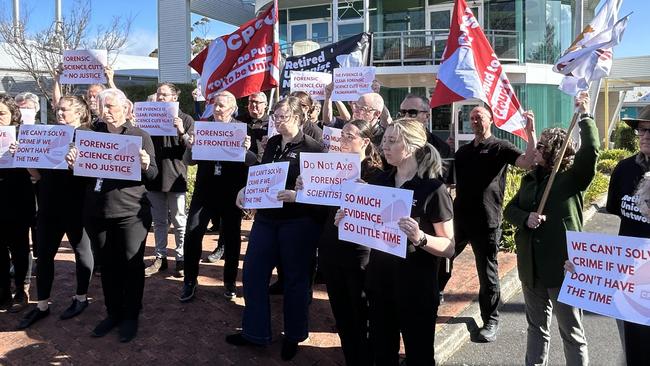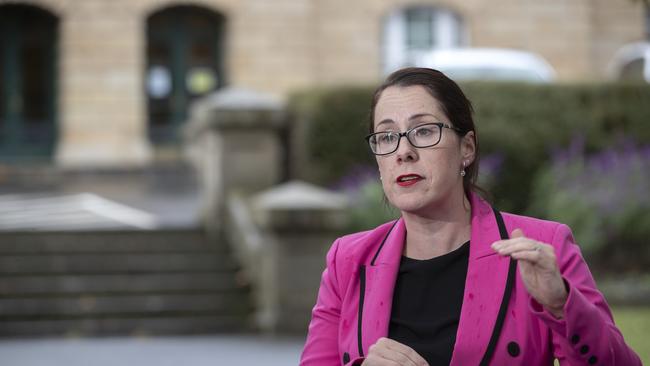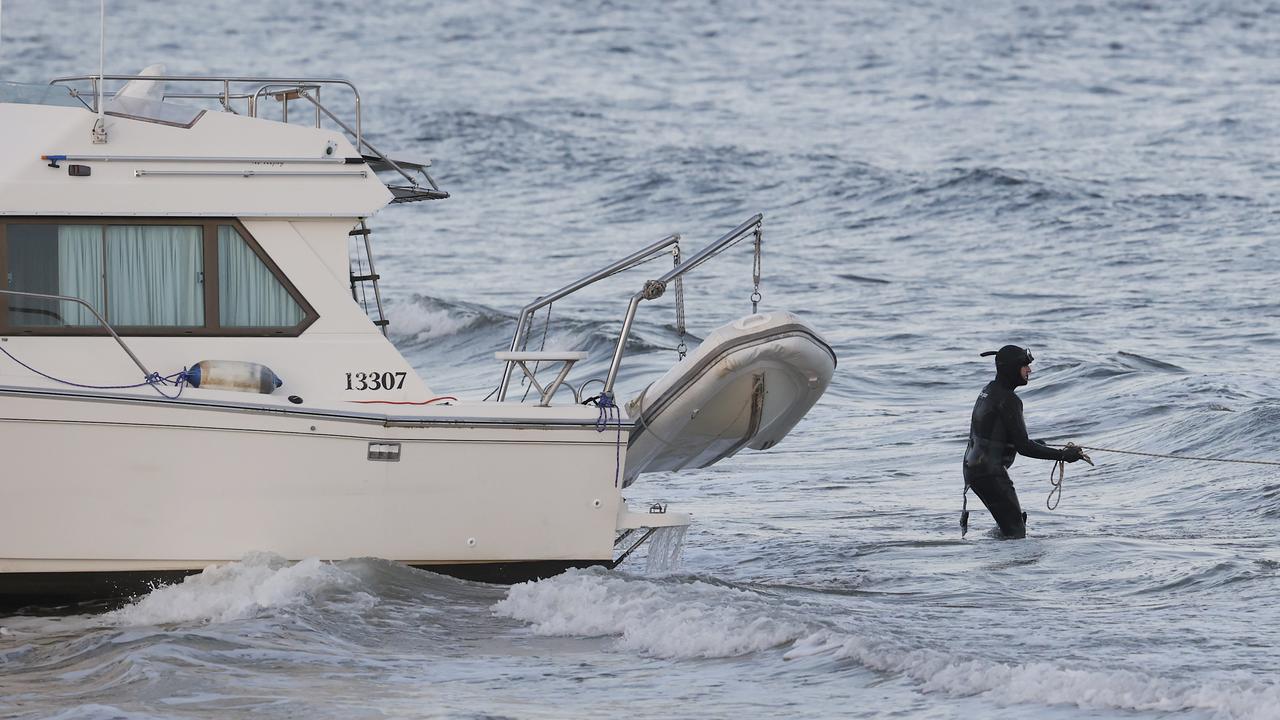Tasmanian industrial action spreads as workers fight for pay parity, against job cuts
Forensic science staff have become the latest Tasmanian workers to walk off the job as an statewide surge in industrial action spreads.

Tasmania
Don't miss out on the headlines from Tasmania. Followed categories will be added to My News.
Forensic science staff have become the latest Tasmanian workers to walk off the job as a statewide surge in industrial action spreads.
Much of the unrest reflects longstanding wage differences with interstate counterparts and the resulting understaffing caused by a competitive labour market.
“We see too many employers expecting to get discount labour in our state, but our work is not worth less just because of where we live,” said Unions Tasmania secretary Jessica Munday.
Forensic Science Services Tasmania took stop-work action on Thursday over what they say is the government’s plan to cut four full-time positions, Community and Public Sector Union general secretary Thirza White said.
“Cutting staff numbers at FSST at a time when other Australian laboratories are
expanding their staff numbers and upgrading their facilities shows a lack of care for victims of crime and a lack of understanding of the importance of forensic science in disrupting crime,” she said.

“Forensics is a frontline service, and it must not be exposed to budget cuts.
“Current under-resourcing means that work in areas such as cold case investigation and method development is delayed or has to be put on hold indefinitely,” she said.
“The proposed job cuts will delay wait times for police investigations and courts, which makes it very difficult for victims of crime to move on with their lives”.
Minister for Police, Fire and Emergency Services Felix Ellis repeated the government line that “frontline services” would not be cut.
“We’ve made it really clear that this budget will be delivering more support for frontline workers and more funding, not less,” he said.
“We’re talking about more funding for our key workers, and obviously these workers at Forensic Sciences Tasmania do incredible work, vital work and we’ll continue to invest in that.
“Now, obviously, we’re working through a process in terms of efficiencies, we need to make sure that our public service is efficient, it’s productive, and it’s delivering for the Tasmanian community.”
The impact of industrial action has also been felt in the state’s energy sector where industrial action by TasNetworks staff was blamed for delays to resolving a major electrical outage in Launceston on Wednesday.
Among their claims are pay parity with workers in similar roles interstate.
TasNetworks has suspended all work involving planned power interruptions until Sunday and Minister for Energy and Renewables Nick Duigan has condemned the action.
“Demands for unrealistic wage increases at the same time disruptions are affecting small businesses and the livelihoods of their employees, does nothing to serve the union movement’s reputation with the community,” he said.
Child safety workers in Launceston also took stop-work action this week because of staffing shortages.
“Workers are warning that the government’s fragmented approach, and the failure to implement a comprehensive market allowance for all frontline child safety workers, is grossly insufficient,’ Health and Community Services Union Industrial Manager Lucas Digney said.
And Members of the Australian Nursing and Midwifery Federation have been involved in industrial ongoing action of their own citing “unrelenting unreasonable workloads, lack of resources and untenable working conditions.”
Staff at Saputo Dairy have been waging a long-running a campaign over claims the company is paying workers at its Burnie site 21 per cent less than it pays for the same jobs in Victoria.
Catholic school teachers threaten action
Teachers in Tasmania’s Catholic schools are threatening industrial action saying they are falling behind their state school colleagues as they negotiate to replace an enterprise agreement that expired three years ago.
After negotiations continued on Thursday, Catholic Education Tasmania said more bargaining meetings were scheduled for Monday and it had not yet received “any notices involving staff removing themselves from the workplace”.
Independent Education Union secretary David Brear said teachers were committed to their students and school communities “but they are not just going to lay down and put up with inferior conditions”.
“These employers must be living on another planet if they think that their staff will vote in favour of an Agreement which allows for the forced transfer of staff 65 km away from where they’re currently working,” he said.
“If Catholic employers want to avoid disruption in their schools they need to act quickly because staff have had enough.
“The indifference this employer is showing its own staff is beyond belief – especially in a time of teacher shortage.”
The majority of the 875 teachers surveyed voted in favour of taking 18 forms of protected industrial action with 91.8 per cent supporting bans, 93.5 per cent in favour of one hour stoppages and 80 per cent supporting a 24 hour strike.
The yes vote to action means teachers are legally permitted to take industrial action ranging from partial work-bans, including not responding to emails, bans on duty and a full day strike.
Catholic Education Tasmania said it recognised the right for employees to apply for protected industrial action and did not oppose the application to the Fair Work Commission.
A spokesperson said it was currently assessing the potential operational impacts of any action.
“Catholic Education Tasmania’s priorities remain the safety and wellbeing of our students and staff while maintaining the educational environment,” the spokesperson said.
“Catholic Education Tasmania will be seeking assurances from the IEU that staff undertaking protected industrial action will do so in ways that do not impact on other staff, students, and families.”
Catholic teachers say delays in negotiating a new agreement to replace the one that expires on September 1 mean they have fallen significantly behind Tasmanian government schools.
They say part time teachers in primary schools are being paid a lower hourly rate than their colleagues in government schools and paid parental leave entitlements are four weeks less for birth parents, and three weeks less for partners.
Originally published as Tasmanian industrial action spreads as workers fight for pay parity, against job cuts


